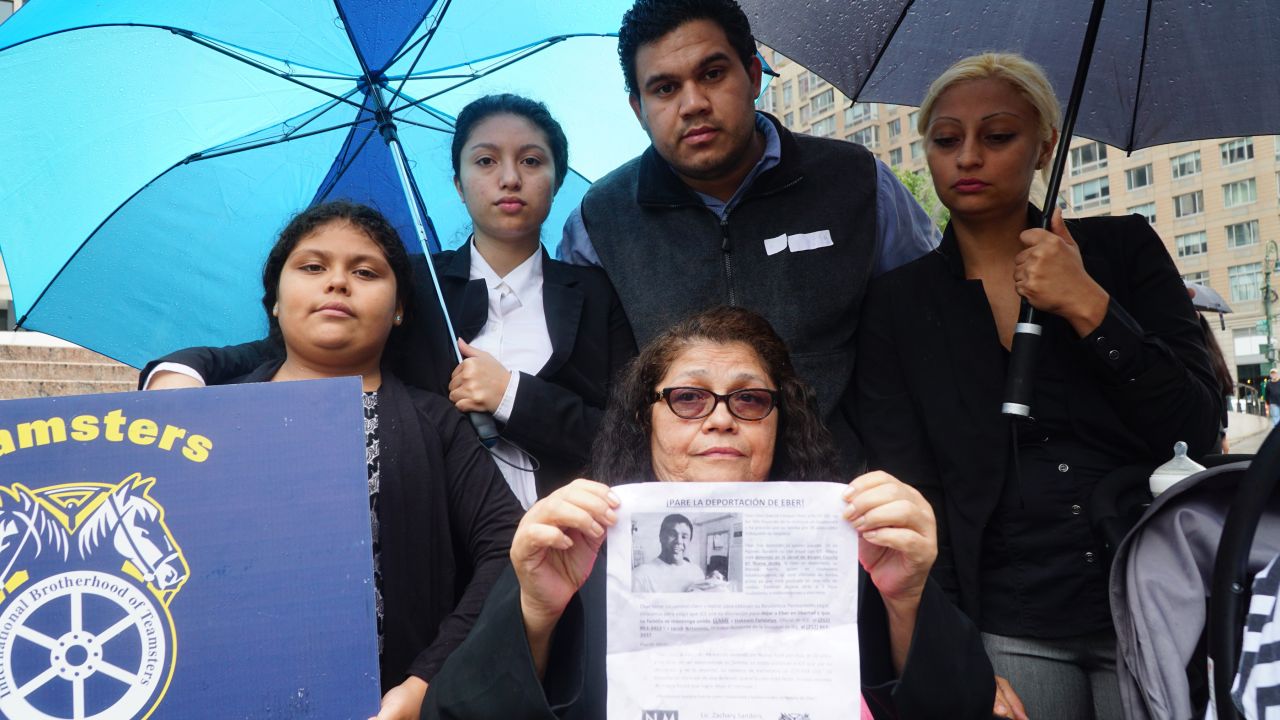
Eber Garcia Vasquez 's family with a flyer asking supporters to call ICE. (Photo courtesy of Teamsters Joint Council 16)
This Q&A is part of Sarah Jaffe’s series Interviews for Resistance, in which she speaks with organizers, troublemakers and thinkers who are doing the hard work of fighting back against America’s corporate and political powers. This interview has been edited for length and clarity.
Teamsters Joint Council 16, with 27 affiliate local unions representing 120,000 workers in the New York City area, has declared itself a so-called sanctuary union after the deportation of one of its members. In a statement last week, the union said it will “protect the rights and safety of all of our membership regardless of immigration status” and “stands in solidarity with all communities under attack.” The union will hold “Know Your Rights” trainings and provide legal assistance to its members. The move comes after a long-time Teamsters member, Eber Garcia Vasquez, was unexpectedly deported earlier this month. In this interview, Jaffe speaks with George Miranda, president of the Teamsters Joint Council 16, about the decision.
Sarah Jaffe: Let’s start at the beginning. One of your members was deported last week, right?
George Miranda: Correct. Eber Garcia Vasquez was recently deported because his asylum case had been turned down in 2013. He checks in once a year routinely [with immigration authorities] and answers a few questions. He has been a Teamster for [over two decades] and has been working in this country and raising his family.
— George Miranda
This time after he went in for his annual check-in, they detained him and scheduled him for deportation. He left behind his wife, an American citizen, and his three kids, who are also US citizens. He has submitted an application for a green card and was thought to be eligible for it, obviously, until this incident. Now he is in Guatemala. That is the story. If it happens to him, it could happen to anybody.
SJ: Your union had a campaign trying to stop his deportation. Can you tell us a little bit about that?
GM: Yes, we had a campaign — and are continuing it — to stop his deportation. We had a lot of organizations come to our aid. We had a protest and rally, and we still have a campaign petition circulating to stop the deportation. But unfortunately, he was on the fast track for deportation for some unknown reason. Nobody is telling us why. From the time they picked him up from the time he was in Guatemala was 13 days.
The only reason they could detain him was because he was adhering to his release [after being turned down for asylum] that he had to report in once a year.

Eber Garcia Vasquez and his granddaughter (Photo courtesy of the family of Eber Garcia Vasquez)
SJ: Can you tell us a little bit more about that, the fact that a lot of people like him are checking in with authorities…
GM: It is a condition that [undocumented immigrants] have to remain here. You have to report in to immigration folks to answer questions that they routinely ask, “Where are you living?; Are you working?;” What’s your address?” and so forth. Obviously, if there are no red flags and there is no criminal record on them or anything, then all they have got to do is just report in so they know exactly where they are. That is it. And he did that routinely.
SJ: After this, your union passed a resolution to become a sanctuary union. Tell us what that means and how that decision came to be.
GM: Immigrant rights and labor rights are explicitly tied together. You can’t have one without the other. If you lose on one issue, whether it is immigrants or the labor, you lose the other. It is obvious that we are tied together and there is no way that we could say that we are not a union of immigrants.
It seems to us that we need to protect our members. We need to protect our members now more than ever since this administration has taken the position that they have on immigrants. So we have decided to be a sanctuary union, meaning that we protect our members. They are working, they are earning their living, they are supporting their families and they are not doing anything that is criminal. We are not going to cooperate with the immigration service whatsoever in going after our members.
We are going to help our members with attorneys and whatever other expertise they need in order to protect themselves and their families and, hopefully, get them out of the mess that they may find themselves in. That is what a sanctuary union is. We are going to indoctrinate all of our members and all of our stewards as to exactly what that means.
SJ: You mentioned that you will try to bargain for protections for undocumented workers in labor contracts as well.
GM: Yes, we put language in to try to protect them so that if they have to go to court or whatever it may be so that they don’t end up losing their jobs or their rights on the job just because ICE [Immigration and Customs Enforcement] came up and is trying to deport them. So, they maintain their rights and their benefits.
SJ: These days, the labor movement is rather invested in the rights of immigrant workers, but that wasn’t always so. People like Trump still try to play off immigrant workers against American-born workers saying, “Oh, they are coming for your jobs.” Talk about why it is important for unions to fight on that front.
GM: The labor movement was made up of immigrants going back in the early days of this country. You cannot separate us from the immigration situation in this country. They are explicitly tied together. These people earn a living, they are in building trades, they are mechanics, and they are in every walk of life that we have. They are part of the fiber of the labor movement. We are tied at the hip.
SJ: Your union also has been involved in actions such as protesting against the Muslim ban and the border wall. Talk about what that organizing in the community looks like for your union.
GM: They are awakening a giant right now. Little by little people are seeing that we are all tied together and we all have the same issues, whether it is putting a wall up or whatever it may be. All of it is designed to weaken unions and weaken the unity of immigrants and send them back. People are now seeing that we are more alike than we have ever been before and that we have to start waking up and fighting back. That is what this is all about.
SJ: How can people keep up with you and with the union?
GM: They can contact me at the Teamsters Joint Council 16 and follow us on Facebook.
Interviews for Resistance is a project of Sarah Jaffe, with assistance from Laura Feuillebois and support from the Nation Institute. It is also available as a podcast on iTunes. Not to be reprinted without permission.




